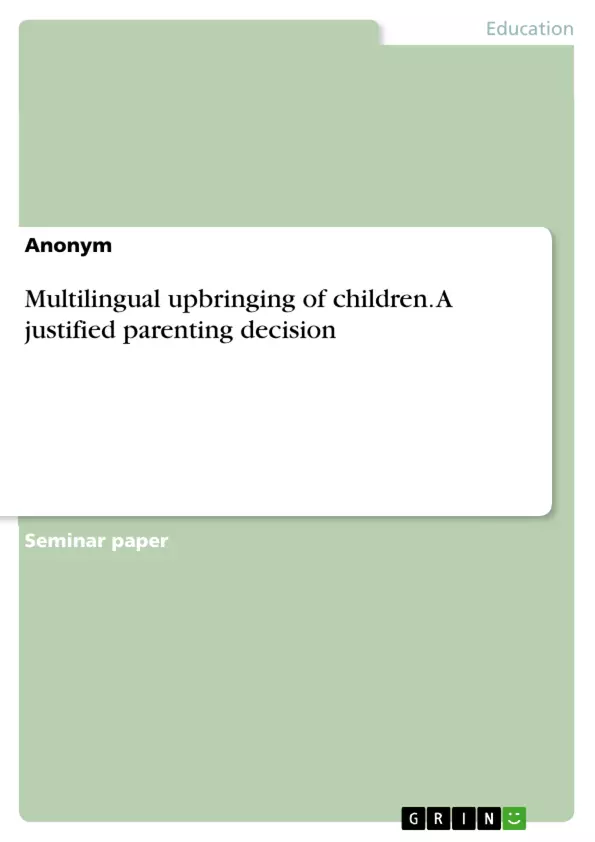This paper deals with the prejudices and fears that are still associated with multilingual education of children. It is often assumed that more than two languages (e.g. trilingual education) exceed children's abilities and that children could suffer linguistic damage as a result. This paper therefore deals with studies on multilingualism in infancy, childhood, adulthood and advanced age. It is shown that multilingualism is not harmful, but has the opposite effect: cognitive stimulation. At the same time, reference is made to the normative language development of children compared to the development of multilingual children.
Inhaltsverzeichnis (Table of Contents)
- Introduction
- Reasons for multilingual upbringing of children
- Child-centered motives
- Parent-centered motives
- General dis-/advantages of multilingualism
- Advantages shown by research
- For infants
- For adults
- For the elderly
- Disadvantages shown by research
- Advantages shown by research
- Discussion
- Conclusion
- List of References
Zielsetzung und Themenschwerpunkte (Objectives and Key Themes)
This paper aims to analyze whether the view of multilingualism as beneficial for child development is justifiable. It seeks to understand the motives behind parents' decisions to raise their children multilingually and explore the research evidence surrounding the potential advantages and disadvantages of multilingualism. The paper focuses on presenting a balanced perspective, incorporating both positive and negative aspects to draw a justified conclusion.
- Motives for multilingual upbringing
- Child-centered vs. parent-centered motives
- Research on the impact of multilingualism across different life stages
- Positive and negative consequences of multilingualism
- A balanced view of multilingualism and its implications for parenting decisions
Zusammenfassung der Kapitel (Chapter Summaries)
- Introduction: The introduction establishes the context and purpose of the paper, highlighting the ongoing debate surrounding multilingualism in child rearing. It introduces the goal of analyzing parental motives and the justification for multilingual upbringing. The paper will examine the benefits and drawbacks of multilingualism to provide a comprehensive perspective.
- Reasons for multilingual upbringing of children: This chapter explores the diverse motives behind parents' decisions to raise their children multilingually. It categorizes these motives into child-centered and parent-centered, examining the specific benefits for the child's development, future opportunities, and cultural heritage, as well as the personal motivations stemming from parental experiences and background.
- Child-centered motives: This chapter delves into the specific child-centered motives, including social/cultural development, economic advantages, safety needs, developmental benefits, and the child's interests. It provides examples from interviews with parents to illustrate these motivations, emphasizing the importance of providing children with a sense of global diversity, cultural awareness, and opportunities to thrive in a multilingual world.
- Parent-centered motives: This chapter focuses on the motives originating from parental experiences, beliefs, and aspirations. It explores the influence of personal history, cultural background, and societal pressures on parents' decisions. It examines how parents' own experiences with multilingualism shape their views on raising their children in a similar environment.
Schlüsselwörter (Keywords)
This paper focuses on the key themes of multilingual upbringing, child development, parental motives, cognitive development, social and cultural awareness, economic advantages, and research evidence related to the positive and negative impacts of multilingualism. It explores these themes in the context of providing a balanced perspective on the justification for raising children multilingually.
Frequently Asked Questions
Is multilingual upbringing harmful to a child's development?
No, research shows that multilingualism is not harmful; instead, it provides cognitive stimulation and benefits across different life stages.
What are child-centered motives for raising children multilingually?
These include social and cultural development, future economic advantages, and providing a sense of global diversity and awareness.
What are parent-centered motives for multilingual education?
Motives often stem from the parents' own cultural background, personal history with languages, or societal aspirations.
Are there cognitive benefits of multilingualism in old age?
Yes, the paper indicates that multilingualism has positive cognitive effects that persist into advanced age.
How does multilingual development compare to normative language development?
The paper compares the milestones of monolingual children with those of multilingual children to address fears of linguistic damage or delays.
- Arbeit zitieren
- Anonym (Autor:in), 2020, Multilingual upbringing of children. A justified parenting decision, München, GRIN Verlag, https://www.grin.com/document/1187558



